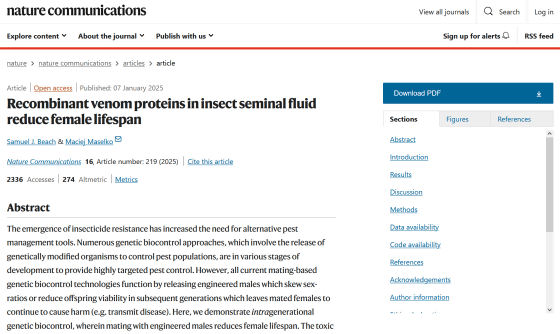An attempt to genetically modify male mosquitoes to secrete toxic semen to prevent the transmission of infectious diseases

Mosquitoes are a public health threat because they transmit infectious diseases such as
Recombinant venom proteins in insect seminal fluid reduce female lifespan | Nature Communications
https://www.nature.com/articles/s41467-024-54863-1

'Toxic' Semen Could Turn Mosquito Mating Deadly to Curb Disease Spread : ScienceAlert
https://www.sciencealert.com/toxic-mosquito-semen-could-turn-mating-deadly-to-curb-disease-spread
Male mosquitoes to be genetically engineered to poison females with semen in Australian research | Health | The Guardian
https://www.theguardian.com/environment/2025/jan/07/male-mosquito-semen-poison-females-australian-research
In order to eradicate mosquitoes that transmit infectious diseases such as malaria, in recent years, experiments have been conducted to release genetically modified male mosquitoes into the wild so that their offspring cannot reproduce. In 2022, Oxitec, the biotechnology company that developed this technology, reported promising results from wild experiments: 'All females that mated with males and inherited the lethal gene died before reaching adulthood.' Since only female mosquitoes after mating suck blood, it is believed that reducing the number of females can prevent the transmission of infectious diseases.
What are the results of an experiment to eradicate mosquitoes by releasing genetically modified mosquitoes into the wild so that their offspring cannot reproduce? - GIGAZINE

But with conventional methods that target the offspring of mosquitoes, the female mosquitoes that mate with the genetically modified males continue to live for several weeks after mating, during which time they can feed on human blood and continue to transmit infectious diseases if they are already carrying pathogens.
So a research team from Macquarie University in Australia came up with a way to genetically modify male mosquitoes to secrete toxic semen in order to directly reduce the lifespan of dangerous female mosquitoes.
The team developed a method to genetically modify male mosquitoes so that their semen contains venom proteins derived from spiders and sea anemones, which are produced in the accessory glands (MAGs) , the human equivalent of the prostate, where they are safely sequestered from the male's hemolymph .
When mating with a female mosquito, the venom protein is injected into the female's body along with the semen. The venom protein is then taken up into the female's hemolymph through the reproductive tract and acts on the central nervous system. In the diagram below, 'A' shows the conventional method that targets offspring, and 'B' shows the new method that targets mating itself. 'A' still poses the risk of blood-sucking after mating, but 'B' reduces the risk of blood-sucking after mating.

When the team tested the technique in
Maciej Maselko , co-author of the paper, said the team plans to test the technique on mosquitoes. 'We need to genetically modify mosquitoes and carry out rigorous safety testing to ensure there are no risks to humans or other non-target species,' he said.
'This approach could potentially work just as quickly as pesticides without harming beneficial species,' said lead author Samuel Beach . Pesticides can have adverse effects on species other than mosquitoes, and mosquitoes can develop resistance to them, but the new approach avoids these disadvantages.

Related Posts:







